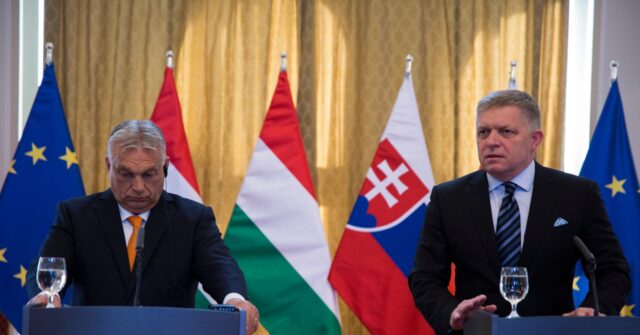The populist-sovereigntist leaders of Hungary and Slovakia warned this week that Brussels risks destroying the fabric of the European Union if the ascension of Ukraine into the bloc is forced through over their objections.
At a press conference in Bratislava Hungarian Prime Minister Viktor Orbán and Slovak Prime Minister Robert Fico both emphasised the importance of EU member states retaining their veto power and for major foreign policy decisions to be made unanimously by all 27 nations.
It comes amid increasing suggestions that the veto power could be suspended or otherwise undermined over disagreements over funding the war in Ukraine and on accepting the war-torn country as a member of the EU.
The concept of unanimity was a crucial element in the formation of the bloc, ensuring that smaller countries would not be overpowered by larger players such as France and Germany. However, there has been increasing disdain for the democratic checks on power as the globalist blob within Brussels has expanded its influence.
Taking to the podium, Prime Minister Fico said: “I hereby call on the decisive players within the European Union to listen to us and not to take any steps that would lead to the liquidation of the EU. Ending the right of veto would be a step leading to the end of the European Union. I am one hundred per cent convinced of this.”
“The EU will be strong if it can find agreement within the diversity of views present, the union will be strong if it respects the sovereign viewpoints of the member states and if it returns to respecting the values of democracy and the rule of law, as this is not always the case,” he added.
Mr Orbán also stressed the need for consensus on significant foreign policies, arguing that if the principle of unanimity is abandoned, member states could be dragged into war even if their citizens and governments were opposed to doing so, thereby eliminating the national sovereignty of EU countries.
The Hungarian PM, who frequently faces accusations of being autocratic, despite having come in and out of power over the past two decades depending on Hungarian elections, went on to mock the notion that Brussels is the protector of democratic values.
“It’s not that Brussels is the custodian of democracy, and they tell us what democracy is. It’s precisely the other way around, in Brussels there are bureaucrats,” he said, adding, “bureaucrats are not at all friends of democracy, bureaucrats are friends of bureaucracy.”
Both Fico and Orbán publicly backed efforts by President Donald Trump to bring the Ukraine war to a close. They rejected any military operations that they argued would prolong the conflict. Unlike many interested parties in the conflict, both Hungary and Slovakia have land borders with Ukraine.
In addition to the threat of admitting a country with contested borders and thereby risking a full-scale conflict between Western powers and Russia, Mr Orbán has argued that allowing Ukraine into the bloc would imperil the Hungarian economy, particularly in the farming sector.
“We were not admitted because of our pretty eyes. The West decided to admit Hungary, Poland, the Czech Republic, and Slovakia because it was in their interest… and I am certain that admitting Ukraine would not serve our interests,” the populist leader said on Monday.
Hungarian EU Minister János Bóka said this week that allowing Ukraine to enter the bloc would likely disrupt farming throughout the union, noting that due to its significant agricultural lands — 41 million hectares compared to 157 million for the EU as a whole — Kyiv would instantly become the largest beneficiary of farming subsidies from Brussels, likely siphoning money away from already struggling farmers in Europe.
Additionally, due to the cheap cost of labour and substandard farming practices, such as the use of genetically modified seeds, Ukrainian food products would quickly undercut EU farmers and drive them out of business. “The accession of Ukraine would destroy Hungarian farmers and flood the EU market with risky quality agricultural products,” Bóka said.
Follow Kurt Zindulka on X: Follow @KurtZindulka or e-mail to: [email protected]
Read the full article here
